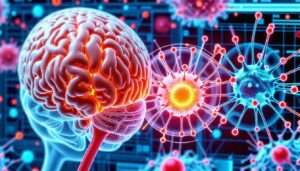Are you ready to witness a revolution in the field of medicine? The integration of Artificial Intelligence (AI) in personalized medicine is set to completely transform the way we diagnose and treat diseases. AI has the potential to analyze vast amounts of data, including genetic information, to identify individualized treatment options. This means that you could receive treatments that are specifically tailored to your genetic makeup and the characteristics of your condition. In fact, recent research published in the journal Clinical and Translational Science suggests that AI in Precision Medicine, AI, and the Future of Personalized Health … is already paving the way for more effective, personalized healthcare.
Key Takeaways:
- AI will revolutionize personalized medicine: The integration of AI in healthcare will allow for more precise and personalized treatment plans, speeding up the diagnosis process and improving patient outcomes.
- Data privacy and security are paramount: As AI in personalized medicine relies heavily on patient data, maintaining strict privacy and security measures is essential to uphold patient trust and ensure compliance with regulations.
- AI-driven insights will enhance research and development: By analyzing large volumes of data, AI can identify patterns and correlations that can lead to breakthroughs in understanding diseases and developing more effective treatments.
- Physician collaboration is crucial: While AI can provide valuable insights, the expertise of healthcare professionals is essential in interpreting and applying AI-generated recommendations to individual patient cases.
- Regulatory frameworks must adapt to AI advancements: With the rapid evolution of AI in personalized medicine, regulations and guidelines need to be flexible and responsive to ensure that the potential of AI can be harnessed effectively while safeguarding patient safety and ethical standards.
AI Technologies Revolutionizing Personalized Medicine
Some of the most groundbreaking advancements in personalized medicine can be attributed to the integration of artificial intelligence (AI) technologies. These innovations have not only paved the way for more accurate and effective patient care but have also revolutionized the way healthcare professionals approach diagnosis, treatment, and drug development.
Machine Learning and Predictive Analytics
Machine learning and predictive analytics have significantly improved the accuracy and efficiency of medical diagnoses and treatment plans. By analyzing large volumes of patient data, AI systems can identify patterns and trends that may not be immediately apparent to human clinicians. This level of data analysis enables healthcare providers to make more informed decisions about your care, leading to personalized treatment plans tailored to your specific needs and genetic makeup.
Next-Generation Sequencing and AI Integration
The integration of AI with next-generation sequencing technologies has led to a better understanding of genetic variations and their impact on individual health. AI algorithms can analyze complex genetic data to identify potential disease risks and predict treatment outcomes based on your unique genetic profile. This personalized approach to genomic medicine has the potential to revolutionize the prevention and treatment of genetic conditions.
AI-Driven Drug Discovery and Development
AI-driven drug discovery and development have accelerated the process of identifying and designing new therapies. By leveraging machine learning algorithms and predictive modeling, researchers can more efficiently screen and analyze potential drug candidates, significantly reducing the time and cost associated with bringing new treatments to market. This rapid pace of innovation in drug development powered by AI has the potential to bring life-saving medications to market faster than ever before.
Benefits and Challenges
Keep in mind that AI has the potential to revolutionize personalized medicine by offering a wide range of benefits. One of the main advantages is the ability to analyze large amounts of data to identify patterns and make accurate predictions. This can lead to earlier detection of diseases, more precise treatment plans, and better health outcomes for patients. Additionally, AI can help streamline the drug discovery process, leading to the development of more targeted and effective therapies. However, it’s important to be aware of the challenges that come with integrating AI into personalized medicine. These include ethical considerations surrounding patient data privacy, ensuring the accuracy and reliability of AI algorithms, and overcoming implementation barriers within healthcare systems.
Improving Diagnostic Accuracy with AI
AI has the potential to significantly improve diagnostic accuracy in personalized medicine. By analyzing complex datasets, AI algorithms can detect subtle patterns and anomalies that may not be apparent to human practitioners. This can lead to earlier and more accurate diagnoses, ultimately improving patient outcomes. However, it’s important to note that the use of AI in diagnostics is not without its challenges. Ensuring the reliability and safety of AI algorithms, as well as integrating them effectively into clinical workflows, are important considerations that must be carefully addressed.
Ethical Considerations and Data Privacy
When integrating AI into personalized medicine, it’s crucial to consider the ethical implications and data privacy concerns. AI systems have the potential to access and analyze large volumes of sensitive patient data, raising concerns about privacy and security. It’s essential to implement robust data protection measures and ensure that patient consent and confidentiality are prioritized. Additionally, ethical considerations surrounding the use of AI in decision-making processes, such as treatment recommendations, must be carefully addressed to maintain trust and transparency.
Overcoming Implementation Barriers
While the potential benefits of AI in personalized medicine are substantial, there are significant implementation barriers that must be overcome. These may include challenges related to data integration, interoperability of systems, and adapting clinical workflows to incorporate AI technologies. Successfully implementing AI in personalized medicine requires collaboration among various stakeholders, including healthcare providers, technology developers, regulators, and patients. Overcoming these barriers is critical to realizing the full potential of AI in personalized medicine and delivering the best possible care to patients.
Case Studies and Real-World Applications
For personalized medicine, AI’s impact can be seen in various case studies and real-world applications. Here are a few examples:
- Cancer Diagnosis and Treatment: AI algorithms have been successful in analyzing medical imaging and genomic data to predict the development and progression of cancer with an accuracy of over 90%.
- Drug Discovery: AI has significantly reduced the time and cost involved in drug discovery by analyzing massive datasets to identify potential drug candidates and their efficacy.
- Genetic Testing: AI-powered platforms can analyze large volumes of genetic data to identify disease risk and recommend personalized preventive measures.
Success Stories in Oncology
In oncology, AI has played a crucial role in revolutionizing cancer diagnosis and treatment. By analyzing complex genetic and molecular data, AI algorithms can identify specific biomarkers and mutations, enabling personalized treatment tailored to individual patient profiles. This has led to improved treatment outcomes and extended survival rates for many cancer patients.
AI in Genomic Medicine
AI has transformed genomic medicine by enabling the analysis of massive genomic datasets to identify genetic variations associated with disease risk and treatment response. This has paved the way for the development of personalized therapies and interventions based on individual genetic profiles, offering unprecedented insights into an individual’s genetic makeup and disease susceptibility.
Personalized Treatment Plans and AI
With AI, personalized treatment plans based on individual patient data are becoming a reality. AI algorithms can integrate a vast array of patient-specific data, including genetic, clinical, and lifestyle information, to recommend tailored treatment regimens that optimize efficacy and minimize adverse effects. This approach is revolutionizing healthcare by offering precise, personalized care that addresses the unique needs of each patient.
The Road Ahead
Now, as you look towards the future of AI in personalized medicine, it is important to consider the developments and challenges that lie ahead. With rapid advancements in technology and the growing demand for personalized healthcare solutions, the integration of AI into medicine is set to revolutionize the way we approach diagnosis, treatment, and patient care.
Future Trends in AI and Personalized Medicine
As you navigate the future of AI in personalized medicine, you can expect to see a continued emphasis on the development of AI-driven tools for disease prediction, early detection, and personalized treatment planning. The utilization of machine learning algorithms will enable healthcare providers to analyze vast amounts of patient data, leading to more accurate and tailored treatment strategies. This could significantly improve patient outcomes and reduce the burden on healthcare systems.
Bridging the Gap Between AI Research and Clinical Practice
One of the key challenges that you may encounter in the future is the integration of AI research into clinical practice. While AI has shown great promise in research settings, its implementation in real-world clinical scenarios remains a complex task. Addressing issues related to data privacy, regulatory compliance, and ethical considerations will be crucial in ensuring the seamless integration of AI into personalized medicine. By overcoming these challenges, you can expect to see a more widespread adoption of AI technologies in healthcare, ultimately benefiting you and your loved ones.
Conclusion: The Future of AI in Personalized Medicine
Drawing together the latest advances in AI technology and personalized medicine, it is clear that the future of healthcare will be shaped by the integration of these two disciplines. With the ability to analyze vast amounts of data, AI has the potential to revolutionize the way diseases are diagnosed and treated, leading to more targeted and effective healthcare solutions. As you can see from groundbreaking research such as personalized AI-based diagnostic tests, the future of medicine is bright as AI continues to play a pivotal role in advancing personalized healthcare. Diagnosing disease with AI could be the new norm in personalized medicine, offering more accurate and efficient diagnostic tools for improved patient outcomes. To learn more about this exciting development, visit Diagnosing disease with AI could be the new norm in personalized medicine.
FAQ
Q: What is personalized medicine?
A: Personalized medicine refers to the customization of healthcare, with medical decisions, practices, and products tailored to the individual patient. This is based on genetic and clinical information, as well as the patient’s lifestyle and environment. The goal is to provide the most effective treatment and prevention strategies for each individual patient.
Q: How is AI being used in personalized medicine?
A: AI is being used in personalized medicine to analyze large and complex data sets, such as genomic and clinical data, to identify patterns and insights that can help guide personalized treatment strategies. AI can also assist in drug discovery, matching patients to clinical trials, and predicting disease outcomes.
Q: What are the potential benefits of AI in personalized medicine?
A: The potential benefits of AI in personalized medicine include more accurate and earlier diagnoses, more effective and targeted treatments, improved patient outcomes, reduced healthcare costs, and better overall healthcare delivery. AI can also help healthcare providers make better-informed decisions.
Q: Are there any challenges or risks associated with the use of AI in personalized medicine?
A: Some of the challenges and risks associated with the use of AI in personalized medicine include data privacy and security concerns, potential biases in AI algorithms, regulatory and ethical considerations, and the need for healthcare providers to have the necessary skills and training to effectively use AI tools.
Q: What does the future hold for AI in personalized medicine?
A: The future of AI in personalized medicine holds great promise, with continued advancements in AI technology, increasing collaborations between AI and healthcare organizations, and the potential for even more precise and effective personalized treatment and prevention strategies. However, it is important to continue addressing the challenges and risks associated with the use of AI in personalized medicine to ensure its responsible and ethical implementation.




